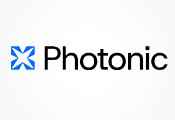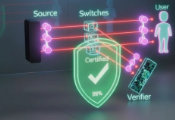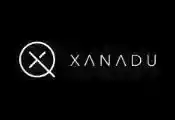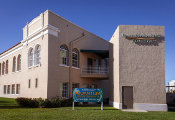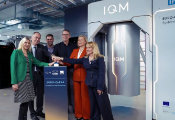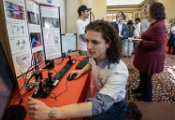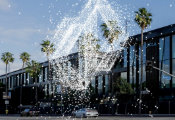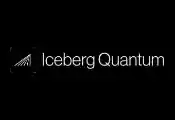University of Chicago Announces Next Phase of Quantum Supercomputer Initiative, Supported by NSF Grant
September 05, 2025 -- A year into a bold experiment in advancing the frontier of quantum computing, the University of Chicago joins its collaborators in celebrating a major step forward and renewed backing from the National Science Foundation (NSF). The National Quantum Virtual Laboratory (NQVL)—a multi-university partnership—enters a new chapter with recent funding from NSF. At the University of Chicago, Seymour Goodman Professor Fred Chong leads the charge as co-principal investigator, working alongside colleagues at Duke, Tufts, North Carolina State, and North Carolina Agricultural and Technical State University. Together, the group has been awarded $4 million to begin actively designing a quantum supercomputer with transformative potential.
Now entering its second phase, the Quantum Advantage-Class Trapped Ion System (QACTI) project seeks to build not just one but two unprecedented quantum computing systems: a 60-qubit “proof of concept” machine anticipated by 2029, and a 256-qubit ion trap computer by 2033. Both targets represent significant advancements in the ability to tackle scientific problems, from climate modeling to drug discovery, that are extremely challenging or even out of reach for conventional computers.
“We are excited and grateful to NSF for this opportunity to bring years of quantum software research to an open quantum platform that will enable users to develop groundbreaking science applications,” said Chong.
The NSF’s phased investment in QACTI reflects a national commitment to building quantum infrastructure reminiscent of longstanding scientific endeavors such as gravitational wave and neutrino observatories. QACTI’s vision goes further: democratizing access to advanced quantum hardware by making it available both locally and via the cloud, so users anywhere in the country can run sophisticated simulations and algorithms. In addition to work on hardware and software, the project puts special emphasis on training the next generation of quantum scientists—engaging students, postdoctoral researchers, and professionals from diverse backgrounds.
The first year saw planning meetings and consultation across academia and industry, ensuring the QACTI system serves as a resource that reflects the needs of the entire quantum computing community. With the new funding, the team will finalize designs, prepare for construction, and refine its workforce development efforts.
For the University of Chicago, participation in QACTI’s second phase is both a testament to its leadership in quantum architecture and software and a commitment to broad collaboration and inclusion. As the initiative advances, the department will share new milestones and opportunities for engagement—reinforcing UChicago’s role in helping build the future of computing.

